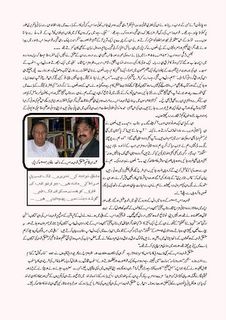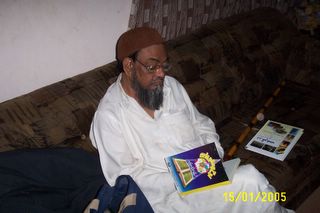
A Tribute to AbdulHayee Mushfiq Khawaja Marhoum - Page 2 of 4

An Entertaining Epic about Saudi Arabia
Humor, History, Facts, Analyses, Appreciation, and Critiques, All in one Guide
The Life & Times of Pakistanis in KSA
Written in Urdu, and published on Saturday, August 14, 2004
(The Independence Day Anniversary)
by: Mohammad Bin Qasim
ISBN 969-8831-00-2, National Library of Pakistan, Islamabad
(c)1998-2004,Hashim Syed Mohammad Bin Qasim, & the Hashim Family
eMail: hashims@gmail.com
خدا گواہ یقیناً اٹھارہے ہیں ہم
قفس کا عیشِ اذیّت بھی آشیاں کے لیے

Book on Saudi Arabia 'Zar Grifth' Launched
Pakistan Times Staff Report
'ZAR GRIFTH' (ISBN-969-8831-00-00), a book about Saudi Arabia by a noted Pakistani writer, was launched earlier this week in Karachi.
Zar Grifth, a book in Urdu, about the life and times of the Pakistanis living in the Kingdom of Saudi Arabia has been published here.
"Zar Grifth", which means "In the Shackles of Money and Greed", is a project of JUSTUJU / The Quest Publishers and has been written by Mr. Hashim Syed Mohammad Bin Qasim, a well known writer and columnist. He is featured at many websites, Pak Tribune and Al Jazeerah. He has been quoted by reputed westren media sources such as Washington Post and Guardian UK.
Mostly in a lighthearted and a hilarious manner, and at times in a serious tone, the book documents the history of the Kingdom of Saudi Arabia, and the ways of life of the close to one million Pakistanis ("PakBaans") living there, over the past quarter century.
This large size 270 page book has 26 Chapters addressing key segments of Saudi life, history, culture, commerce and religion. It is studded with a number of cartoons, sketches, and pictures, and carries two prefaces, penned by top Urdu critics from Karachi and New York.
The critics, Mr. Athar Hashmi (Chief Editor, daily Urdu Newspaper "Jasarath", Karachi), and Mr. Syed Mohammad Haneef Akhgar (a well known Urdu Poet and ex United Nations Development Program - UNDP - Regional Chief, for the Middle East), have expressed their optimism about the success of Zar Grifth among all those who are interested in this important Islamic Country.
These critics have hailed Zar Grifth as a must read not only for a common Pakistani, but also for the diplomats and employees of the Pakistan Government.
The book is to be translated in to English in near future. For the English readers, some chapter summaries are being posted at its website. The readers can obtain more information by visiting: http://www.zargrifth.blogspot.com●
In Zargrifth, Mohammad Bin Qasim documents his novel experience in Saudi Arabia where he worked for 25 years (1981-2004). This is a country that is loved and revered by the Muslim Ummah because of the Kaaba, the house of God, being located there. It was also the abode of our last prophet, Hazrat Muhammad. (PBUH). Every Muslim dreams of the day when he would perform Haj and will be blessed by God.
As one reads through the book, one learns more about the social, economic and political structure of the country. It also describes the bitter realities of the place which are not any secret to the world. Almost everyone would have experienced these themselves or learned of them through friends and relatives.
The very first experience of the author at Riyadh airport was not very pleasant, as he witnessed one of his co-travellers being manhandled. Later, more compatriots were humiliated and discriminated against. The author holds ourselves responsible for this ill-treatment to some extent. There are numerous cases when Pakistanis have entered or tried to penetrate into the Kingdom with fake degrees and documents.
The book provides an insight into the social, economic and political structure of Saudi Arabia. A conservative, closed society, the literacy rate is low with still lower literacy in women. Women cannot drive, nor are they visible in the workplaces. Polygamy is common. The author has cited numerous instances of the low status of women which has often been reported by the print and the electronic media.
The book also throws light on the plight of the workforce from Pakistan and other Asian countries. Since all the migrant workers have to surrender their passports to their Saudi employers, their fate depends on the whims of the employers. Moreover, there is a vast difference between the pay scales of the western and Asian workforce. This difference is also obvious in their attitude towards both the communities.
While appraising the welfare and development work undertaken by the rulers, the author appreciates the honesty and integrity of the common man. Further, the author was in the Kingdom during the Gulf wars and records his personal experiences and views.
The book is entertaining too. Readers will come across anecdotes which are also a comment on the psyche of the indigenous population. The writer points out how linguistic differences create hilarious, as well as, odd situations.
While discussing the Pakistani school in Riyadh, its mismanagement and the negative role of the Pakistani community, the author observes that we are ready to find fault with others but very easily skip our own weaknesses.
The book could have done with better editing. While the book rightly claims to be a guide for people entering the job market in Saudi Arabia, the narration sometimes becomes too personal for a book of this nature. A long list of personal friends is boring for a general reader. Similarly, the recounting of personal problems could have been avoided. Occasionally, undue boasting detracts from the readability of the book.
If you already have been to the Kingdom, this book will refresh your memories of the place. If you have not been there before, you learn much from the book. You will know what to expect and what not to. - Syeda Saleha





